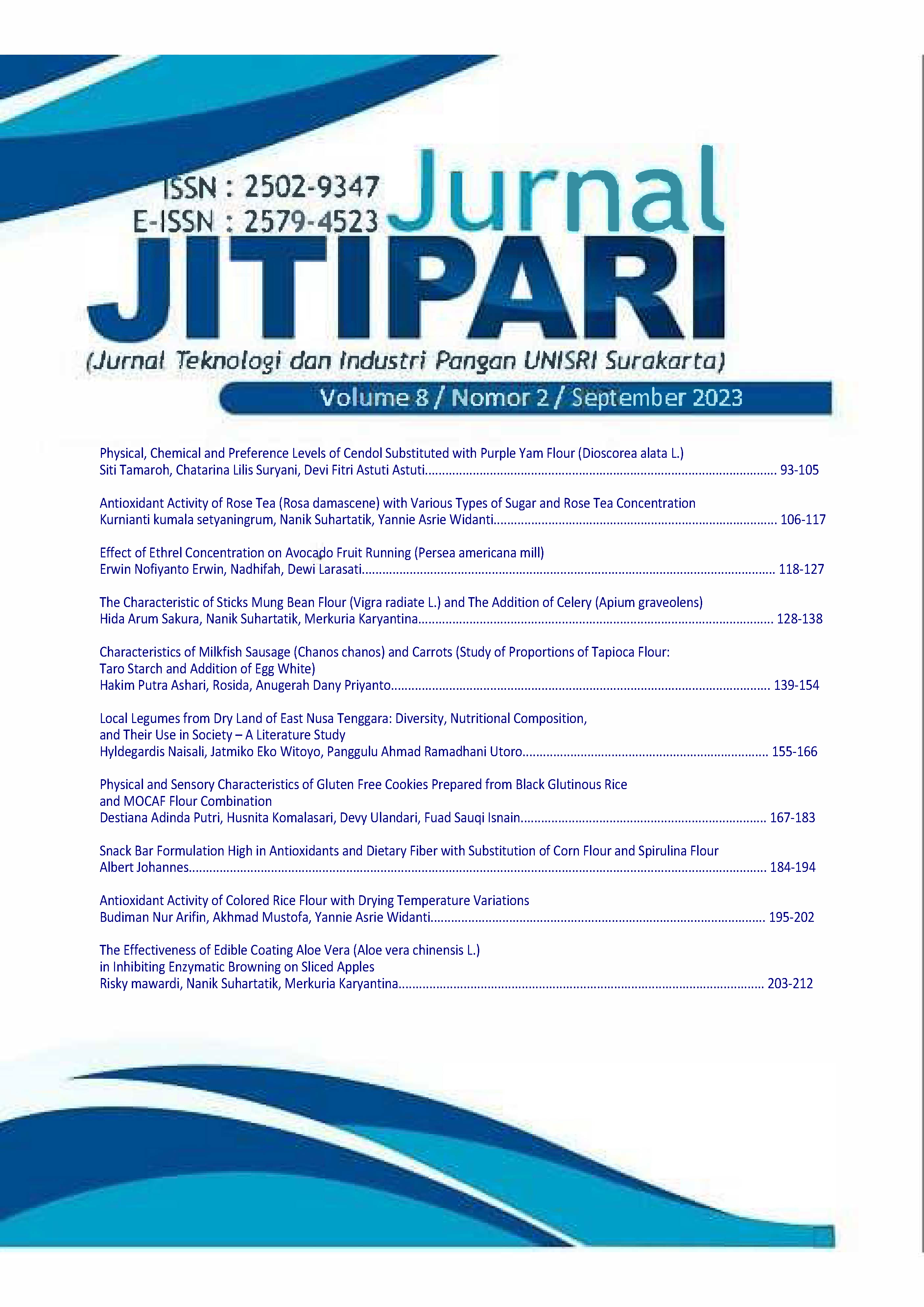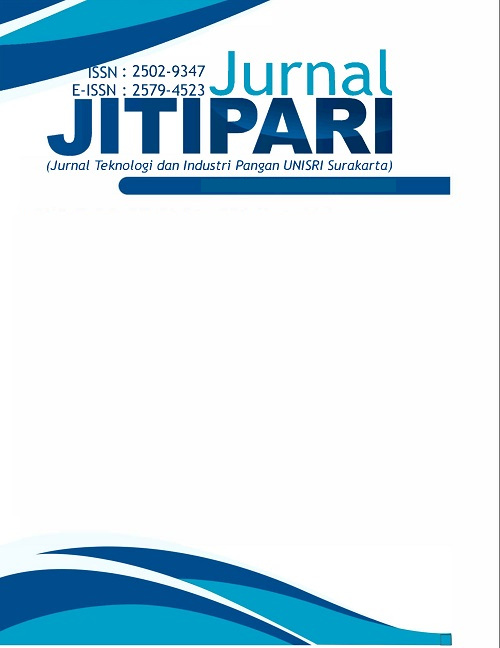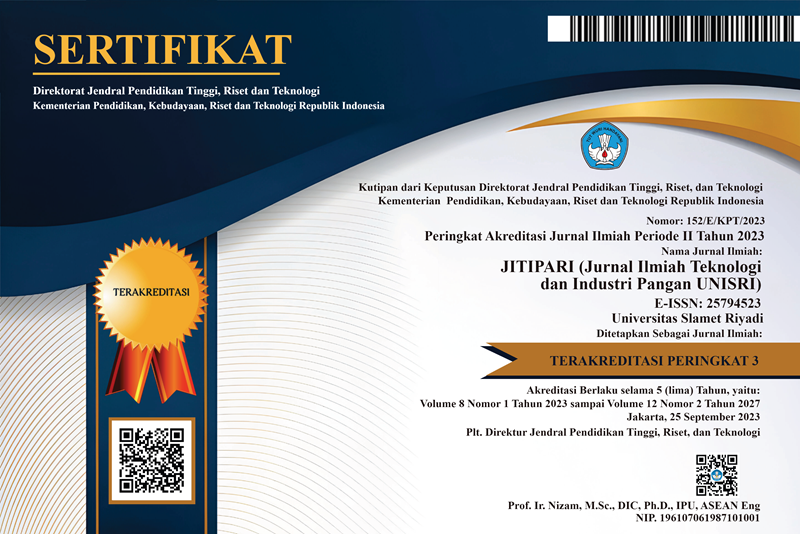Physical and Sensory Characteristics of Gluten Free Cookies Prepared from Black Glutinous Rice and MOCAF Flour Combination
DOI:
https://doi.org/10.33061/jitipari.v8i2.9149Abstract
Extensive research has been conducted to investigate the formulation of a new generation of cereal-based Gluten Free (GF) foods formulated with High-Resistant Starch (RS) sources and high in nutritional value. Black glutinous rice flour is a rich in bioactive compound and MOCAF is known for its high RS content often used as an alternative to wheat flour in the production of gluten-free cookies. The formulation of the combination of these two ingredients needs to be investigated to produce gluten free cookies that have good physical and sensory characteristics. The aims of these research was to investigate the effect of different ratio of Black Glutinous Rice Flour (BGRF) and MOCAF (MF) formulation (F1 = 100:0, F2= 75:25, F3=50:50, F4= 25:75, F5= 0:100) on physical and sensory parameter of resultant GF cookies. The results shows that, cookies with high amount of BGRF showed interesting physical properties with higher diameter, spread ratio, and ∆E of the cookies, lower weight, thickness, baking loss, L*, a*, b*, C* value, and the hedonic score of color, aroma, taste, texture, overall compared to cookies with 100% MF. The best formula that produces gluten free cookies with the highest taste score score is F4 (BGRF 25%:MF 75%) with physical characteristics weight 10.70 g, diameter 48.40 mm, thickness 8.60 mm, spread ratio 5.63, baking loss 17.37 %, L* 53.96, a* 0.63, b* 17.65, C* 17.66, ∆E 48.78. With the combination of BGRF and MF on cookies dough, we manage to obtain cookies that has great potential to increase the nutritional quality of gluten-free food.
References
Anggraeni, Y. P., & Yuwono, S. S. (2014). Pengaruh Fermentasi Alami Pada Chips Ubi Jalar (Ipomoea Batatas) Terhadap Sifat Fisik Tepung Ubi Jalar Terfermentasi [In Press April 2014]. Jurnal Pangan Dan Agroindustri, 2(2), 59–69.
Aoki, N., Kataoka, T., & Nishiba, Y. (2020). Crucial role of amylose in the rising of gluten- and additive-free rice bread. Journal of Cereal Science, 92. https://doi.org/10.1016/j.jcs.2019.102905
Apotiola, Z. O., & Fashakin, J. F. (2013). Evaluation O F Cookies from ( Wheat , Yam , And Soybean ) Blend, 14, 11–17.
Arifin, N., Peng, K. S., Long, K., Ping, T. C., Yusoff, M. S. A., Aini, I. N., & Ming, L. O. (2010). Relationship between textural properties and sensory qualities of cookies made from medium- and long-chain triacylglycerol-enriched margarines. Journal of the Science of Food and Agriculture, 90(6). https://doi.org/10.1002/jsfa.3886
Awan, T. H., Ahmadizadeh, M., Jabran, K., Hashim, S., & Chauhan, B. S. (2017). Domestication and development of rice cultivars. Rice Production Worldwide, 207–216.
Bhaduri, S. (2013). A Comprehensive Study on Physical Properties of Two Gluten-Free Flour Fortified Muffins. Journal of Food Processing & Technology, 04(08). https://doi.org/10.4172/2157-7110.1000251
Bravo-Núñez, Ã., Sahagún, M., & Gómez, M. (2019). Assessing the Importance of Protein Interactions and Hydration Level on Protein-Enriched Gluten-Free Breads: a Novel Approach. Food and Bioprocess Technology. https://doi.org/10.1007/s11947-019-02258-2
Budžaki, S., Koceva Komlenić, D., Lukinac ÄŒaÄić, J., ÄŒaÄić, F., Jukić, M., & Kožul, Ž. (2014). Influence of cookies composition on temperature profiles and qualitative parameters during baking. Croatian Journal of Food Science and Technology, 6(2), 72–78. https://doi.org/10.17508/CJFST.2014.6.2.02
Charoenphun, N., Klangbud, W. K., & Kwanhian, W. (2019). Productionof Gluten Free Cookies Supplemented with Durian Rind Flour. Science and Technology RMUTT Journal, 9(2), 23–38. Retrieved from www.sci.rmutt.ac.th/stj
Choi, Y. S., Jeong, J. Y., Choi, J. H., Han, D. J., Kim, H. Y., Lee, M. A., … Kim, C. J. (2007). Quality characteristics of meat batters containing dietary fiber extracted from rice bran. Korean Journal for Food Science of Animal Resources, 27(2). https://doi.org/10.5851/kosfa.2007.27.2.228
Chung, H. J., Cho, A., & Lim, S. T. (2014). Utilization of germinated and heat-moisture treated brown rices in sugar-snap cookies. LWT, 57(1). https://doi.org/10.1016/j.lwt.2014.01.018
Culetu, A, Manolache, F. A., & Duta, D. E. (2014). Exploratory Study of Physicochemical, Textural and Sensory Characteristics of Sugar-Free Traditional Plum Jams. Journal of Texture Studies. Wiley. https://doi.org/10.1111/jtxs.12057
Culetu, Alina, Stoica-Guzun, A., & Duta, D. E. (2021). Impact of fat types on the rheological and textural properties of gluten-free oat dough and cookie. International Journal of Food Science and Technology, 56(1). https://doi.org/10.1111/ijfs.14611
Deyana Aprilia, N. P. R., Yusa, N. M., & Pratiwi, I. D. P. K. (2019). Perbandingan modified cassava flour (mocaf) dengan tepung kacang hijau (Vigna radiate. L) terhadap karakteristik sponge cake. Jurnal Ilmu Dan Teknologi Pangan (ITEPA), 8(2), 171. https://doi.org/10.24843/itepa.2019.v08.i02.p07
Diniyah, N., Wahyu, F., & Subagio, A. (2019). Karakteristik Tepung Premiks Berbahan Mocaf (Modified Cassava Flour) Dan Maizena Pada Pembuatan Cookies Green Tea. Jurnal Pangan Dan Agroindustri, 7(3), 25–36.
Eneche, E. H. (1999). Biscuit-making potential of millet/pigeon pea flour blends. Plant Foods for Human Nutrition, 54(1). https://doi.org/10.1023/A:1008031618117
Gani, A., Bashir, M., Wani, S. M., & Masoodi, F. A. (2012). Modification of bean starch by γ-irradiation: Effect on functional and morphological properties. Lwt, 49(1), 162–169. https://doi.org/10.1016/j.lwt.2012.04.028
Hanifa, A. P., Millner, J. P., Mc Gill, C. R. M., & Sjahril, R. (2020). Total anthocyanin, flavonoid and phenolic content of pigmented rice landraces from South Sulawesi. In IOP Conference Series: Earth and Environmental Science (Vol. 484, p. 12036). IOP Publishing.
Herawati, B. R. A., Suhartatik, N., & Widayanti, Y. A. (2018). Mocaf (Modified Cassava Flour) Cookies with the Addition of Cinnamon Powder (Cinnamomun burmanni). Jurnal Teknologi Dan Industri Pangan, 3(1), 33–40.
Jemziya, M. B. F., & Mahendran, T. (2017). Physical quality characters of cookies produced from composite blends of wheat and sweet potato flour. Ruhuna Journal of Science, 8(1). https://doi.org/10.4038/rjs.v8i1.23
Kadan, R. S., Bryant, R. J., & Miller, J. A. (2008). Effects of milling on functional properties of rice flour. Journal of Food Science, 73(4). https://doi.org/10.1111/j.1750-3841.2008.00720.x
Kim, H. I. L., Lee, I. S., Kang, J. Y., & Kim, G. Y. (2002). Quality characteristics of cookies with various levels of functional rice flour. Korean Journal of Food Science and Technology, (34).
Kristanti, D., Setiaboma, W., & Herminiati, A. (2020). Karakteristik Fisikokimia Dan Organoleptik Cookies Mocaf Dengan Penambahan Tepung Tempe (Physicochemical and Organoleptic Characteristics of Mocaf Cookies with Tempeh Flour Additions). Biopropal Industri, 11(1), 1–8.
Kumar, N., & Murali, R. D. (2020). Black Rice: A novel ingredient in food processing. J Nutr Food Sci, 10(2), 771.
Luo, D., Liang, X., Xu, B., Kou, X., Li, P., Han, S., … Zhou, L. (2017). Effect of inulin with different degree of polymerization on plain wheat dough rheology and the quality of steamed bread. Journal of Cereal Science, 75, 205–212.
Mohammadi, M., Khorshidian, N., Yousefi, M., & Khaneghah, A. M. (2022). Physicochemical, rheological, and sensory properties of gluten-free cookie produced by flour of chestnut, date seed, and modified starch. Journal of Food Quality. Hindawi Limited. https://doi.org/10.1155/2022/5159084
Monteiro, J. S., Farage, P., Zandonadi, R. P., Botelho, R. B. A., de Oliveira, L. de L., Raposo, A., … Araújo, W. M. C. (2021). A systematic review on gluten-free bread formulations using specific volume as a quality indicator. Foods. https://doi.org/10.3390/foods10030614
Naqash, F., Gani, A., Gani, A., & Masoodi, F. A. (2017). Gluten-free baking: Combating the challenges-A review. Trends in Food Science & Technology, 66, 98–107.
Nursyahidah, F., & Albab, I. U. (2021). Learning Design on Surface Area and Volume of Cylinder Using Indonesian Ethno-mathematics of Traditional Cookie maker Assisted by GeoGebra. Mathematics Teaching-Research Journal, 13(4).
Okpala, L., Okoli, E., & Udensi, E. (2013). Physicoâ€chemical and sensory properties of cookies made from blends of germinated pigeon pea, fermented sorghum, and cocoyam flours. Food Science & Nutrition, 1(1). https://doi.org/10.1002/fsn3.2
Oladunjoye, A. O., Eziama, S. C., & Aderibigbe, O. R. (2021). Proximate composition, physical, sensory and microbial properties of wheat-hog plum bagasse composite cookies. Lwt, 141(January). https://doi.org/10.1016/j.lwt.2021.111038
Olawoye, B., Adeniyi, D. M., Oyekunle, A. O., Kadiri, O., & Fawale, S. O. (2017). Economic Evaluation of Cookie made from blend of Brewers′ Spent Grain (BSG), groundnut cake and sorghum flour. Open Agriculture. Walter de Gruyter GmbH. https://doi.org/10.1515/opag-2017-0043
Padalino, L., Conte, A., & Nobile, M. A. Del. (2016). Overview on the general approaches to improve gluten-free pasta and bread. Foods, 5(4). https://doi.org/10.3390/foods5040087
Pang, Y., Ahmed, S., Xu, Y., Beta, T., Zhu, Z., Shao, Y., & Bao, J. (2018). Bound phenolic compounds and antioxidant properties of whole grain and bran of white, red and black rice. Food Chemistry, 240, 212–221.
Pareyt, B., & Delcour, J. A. (2008). The role of wheat flour constituents, sugar, and fat in low moisture cereal based products: A review on sugar-snap cookies. Critical Reviews in Food Science and Nutrition, 48(9). https://doi.org/10.1080/10408390701719223
Pareyt, B., Talhaoui, F., Kerckhofs, G., Brijs, K., Goesaert, H., Wevers, M., & Delcour, J. A. (2009). The role of sugar and fat in sugar-snap cookies: Structural and textural properties. Journal of Food Engineering, 90(3). https://doi.org/10.1016/j.jfoodeng.2008.07.010
Pradipta, S., Ubaidillah, M., & Siswoyo, T. A. (2020). Physicochemical, functional and antioxidant properties of pigmented rice. Current Research in Nutrition and Food Science Journal, 8(3), 837–851.
Rathna Priya, T. S., Eliazer Nelson, A. R. L., Ravichandran, K., & Antony, U. (2019). Nutritional and functional properties of coloured rice varieties of South India: a review. Journal of Ethnic Foods, 6(1), 1–11.
Rini, Yenrina, R., Anggraini, T., & Chania, N. E. (2019). The Effects of Various Way of Processing Black Glutinous Rice (Oryza sativa L. Processing Var Glutinosa) on Digestibility and Energy Value of the Products. In IOP Conference Series: Earth and Environmental Science (Vol. 327). Institute of Physics Publishing. https://doi.org/10.1088/1755-1315/327/1/012013
Santos, F. G., Aguiar, E. V, Centeno, A. C. L. S., Rosell, C. M., & Capriles, V. D. (2020). Effect of added psyllium and food enzymes on quality attributes and shelf life of chickpea-based gluten-free bread. Lwt, 134, 110025.
Sriroth, K., Piyachomkwan, K., Wanlapatit, S., & Oates, C. G. (2000). Cassava Starch Technology: The Thai Experience. Starch/Staerke, 52(12). https://doi.org/10.1002/1521-379X(200012)52:12<439::AID-STAR439>3.0.CO;2-E
Sugih, A. K., Christabella, L., Kristianto, H., & Prasetyo, S. (2019). Effect of different types of phosphorylating reagent on the synthesis of modified tapioca starch. In IOP Conference Series: Materials Science and Engineering (Vol. 673). https://doi.org/10.1088/1757-899X/673/1/012001
Sulieman, A. A., Zhu, K. X., Peng, W., Hassan, H. A., Obadi, M., Siddeeg, A., & Zhou, H. M. (2019). Rheological and quality characteristics of composite gluten-free dough and biscuits supplemented with fermented and unfermented Agaricus bisporus polysaccharide flour. Food Chemistry, 271. https://doi.org/10.1016/j.foodchem.2018.07.189
Sumardiono, S., Riska, L., Jos, B., & Pudjiastuti, I. (2019). Effect of Esterification on Cassava Starch: Physicochemical Properties and Expansion Ability. Reaktor, 19(1). https://doi.org/10.14710/reaktor.19.1.34-41
Titi, C. S., Fachrudin, R., Ruriani, E., & Yuliasih, I. (2018). Effect of Agitation in Alkalization Process on the Characteristics of Sodium Carboxymethyl Sago and Cassava Starches. In IOP Conference Series: Earth and Environmental Science (Vol. 147). https://doi.org/10.1088/1755-1315/147/1/012016
Usman, M., Ahmed, S., Mehmood, A., Bilal, M., Patil, P. J., Akram, K., & Farooq, U. (2020). Effect of apple pomace on nutrition, rheology of dough and cookies quality. Journal of Food Science and Technology, 57(9). https://doi.org/10.1007/s13197-020-04355-z
Xiong, Q., Zhang, J., Shi, Q., Zhang, Y., Sun, C., Li, A., … Zhu, J. (2022). The key metabolites associated with nutritional components in purple glutinous rice. Food Research International, 160. https://doi.org/10.1016/j.foodres.2022.111686
Yang, L., Wang, S., Zhang, H., Du, C., Li, S., & Yang, J. (2022). Effects of black soybean powder particle size on the characteristics of mixed powder and wheat flour dough. Lwt, 167(June). https://doi.org/10.1016/j.lwt.2022.113834
Yang, L., Wang, S., Zhang, W., Zhang, H., Guo, L., Zheng, S., & Du, C. (2022). Effect of black soybean flour particle size on the nutritional, texture and physicochemical characteristics of cookies. LWT, 164, 113649.
Yangsun, K., Kyunghwa, K., & Junho, L. (2006). Quality Characteristics of Black Rice Cookies as Influenced by Content of Black Rice Flour and Baking Time. Journal of the Korean Society of Food Science and Nutrition, 35(4). https://doi.org/10.3746/jkfn.2006.35.4.499
Zambelli, R. A., Galvão, A. M. M. T., De Mendonça, L. G., De Souza Leão, M. V., Carneiro, S. V., Lima, A. C. S., & Melo, C. A. L. (2018). Effect of different levels of acetic, citric and lactic acid in the cassava starch modification on physical, rheological, thermal and microstructural properties. Food Science and Technology Research, 24(4). https://doi.org/10.3136/fstr.24.747
Zhang, S., Ma, Q., Dong, L., Jia, X., Liu, L., Huang, F., … Zhang, R. (2022). Phenolic profiles and bioactivities of different milling fractions of rice bran from black rice. Food Chemistry, 378. https://doi.org/10.1016/j.foodchem.2021.132035
Zhao, B., Deng, J., Li, M., Li, H., Zhang, Y., Gong, H., & Chen, Z. (2020). Preparation and quality evaluation of potato steamed bread with wheat gluten. Food Science & Nutrition, 8(8), 3989–3998.
Downloads
Published
How to Cite
Issue
Section
License
Copyright (c) 2023 Destiana Adinda Putri, Husnita Komalasari, Devy Ulandari, Fuad Sauqi Isnain

This work is licensed under a Creative Commons Attribution-ShareAlike 4.0 International License.
Authors who publish this journal agree to the following terms:
- Authors retain copyright and grant the journal right of first publication with the work simultaneously licensed under a Creative Commons Attribution-ShareAlike 4.0 International (CC BY-SA 4.0) that allows others to share the work with an acknowledgement of the work's authorship and initial publication in this journal.
- Authors can separately make additional contractual arrangements for non-exclusive distribution published by the journal (e.g., publish it in a book), with an acknowledgement of its initial publication in this journal.
- Authors are allowed and encouraged to send their work via online (e.g., in the institutional repositories or their website) after published by the journal.










